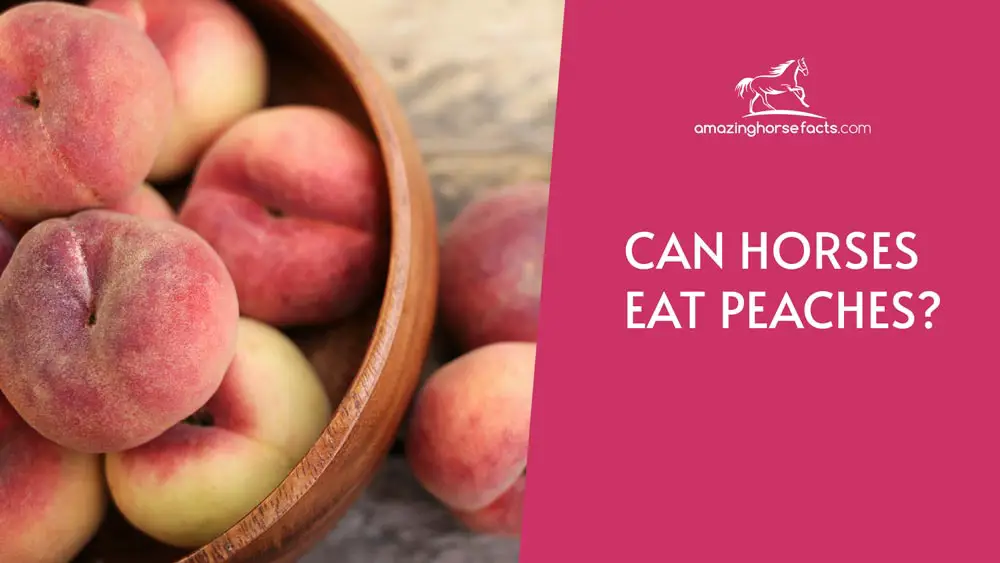Skip To Section

Can Horses Eat Peaches?
Yes! Horses can eat peaches as long as you remove the pit and any peach tree leaves, and the horse doesn’t suffer from any metabolic disorders. Both the peach pits and the peach tree leaves are toxic to horses.
It would be best if you also were cautious about how much you feed your horse at a time since horses should have a limited amount of fruit in their diet in general.
This article will take you through some of the health benefits of peaches, as well as some of the risks that come with feeding peaches to your horse that you should be aware of.
Remember that all horses are different, so you should always be cautious when introducing anything new into your horse’s diet and observe them keenly for any side effects.
Benefits
There are plenty of misconceptions when it comes to whether peaches are safe for horses. Many horse owners believe that they are entirely poisonous for horses and therefore aren’t safe to give to horses. However, peaches are not toxic, and there are some health benefits from giving them to your horse as a treat.
Feeding fruits to your horse can make for a great and healthy treat.
Peaches have health benefits like lots of nutrients and vitamins that can aid in your horse’s wellbeing. They’re a great source of vitamin A and C, which are antioxidants and help decrease inflammation.
Peaches also contain potassium and omega-fatty acids as well as dietary fiber. Like letting horses eat bananas, feeding peaches to your horse between competitions can help them recover from fatigue and overworking their muscles.
Peaches also have comparatively low sugar levels than other fruits, making them an excellent option for competitive horses.
Peaches can be an excellent treat for horse owners to give their horses now and then as long as they’re careful not to give their horse too many.
Risks
There’s always a risk with introducing new foods into your horse’s diet. It’s essential to start with a small amount when introducing peaches into their diet and waiting to see any harmful side effects.
You can always speak with a veterinarian before giving your horse any peaches to see what they recommend.
Ensure that you keep horses away from pastures with peaches trees since there is a good chance your horse will try to eat one of the fallen peaches, especially if they’re used to getting peaches as treats.
Peaches leaves and pits are very poisonous to horses, and they are likely to get very sick.
The leaves and pits contain cyanide which can cause rapid heart rate and breathing problems. You should contact a vet immediately if you see any nasty side effects to your horse eating peaches or if you suspect they have eaten one with the pit or leaves.
Peaches can also cause colic gas since horses are prone to gastrointestinal problems. Cutting the peach into thin slices can help prevent and limit this effect.
Are Peaches Good For Horses?
Fresh peaches are perfect for your horse, especially since they can help with inflammation and provide an excellent vitamin A and C source. However, make sure you stick to fresh peaches and avoid any canned, dried, or peach-flavored foods since they often contain a lot of sugar and various other additives that are not good for horses.
It would be best if you were generally cautious about feeding fruits to your horse as they should not replace other foods in their diet or treat them as a meal on their own. It can cause an imbalance in their diet and result in colic and other severe diseases.
Too much sugar in a horse’s diet can cause weight gain and diseases like laminitis, metabolic syndrome, and insulin resistance.
Are Peaches Safe For Horses To Eat?
Your horse can eat peaches as long as you remove any leaves and pits. However, if your horse has equine metabolic syndrome, then you should not give them peaches.
Peaches contain sugar and carbohydrates, and while they don’t contain high amounts, it’s still more than a horse can handle if they can’t deal with glucose properly.
Horses with hyperkalemic periodic paralysis, HYPP, also should not eat peaches as peaches contain about 333 milligrams of potassium. Any raise in their potassium levels can cause muscle tremors in mild attacks, but more severe cases will require immediate help from a veterinarian. You can learn more about HYPP at the Amerian Association of Equine Practitioners website.
Peaches pits can also cause your horse to choke because of their size. Since horses cannot dislodge anything they choke on themselves, this can be a fatal outcome if you don’t correctly cut the peach.
Peaches’ most significant choking hazard is the pit itself since the pit cannot be chewed and isn’t soft enough to slip down their throat easily.
They aren’t as toxic as the leaves, but it’s best to consider them just as poisonous and remove the pit before letting your horse anywhere near a peach to be safe.
To get a complete guide of what horses can eat so, you can find an alternative treat for your horse, check out this article at AmazingHorseFacts.com.
Are Peaches Toxic To Horses?
While many people think peaches are toxic for horses, that isn’t entirely true. Peaches are part of the prunus family of trees which means that their pits produce harmful amounts of cyanide. The leaves of peach trees contain amygdalin which is a substance that can produce cyanide and can be even more potent if the leaves are damaged or starting to wilt.
Cyanide poisoning causes the oxygen supply to be blocked and can result in death if not treated. Cyanide poisoning in horses causes symptoms such as:
- Rapid heart rate
- Trouble breathing
- Dilated pupils
- Shock
If you ever think that your horse is suffering from cyanide poisoning, you should contact a vet immediately.

Do Horses Like Peaches?
Horses are herbivores and enjoy many different kinds of plants, including fruits and vegetables. Horses are not generally picky eaters and will take any fruits or vegetables offered to them.
Peaches are a lovely soft and sugary fruit that horses love and are just as likely to enjoy as humans are. That doesn’t mean you won’t come across of horse who refuses to eat peaches, but it’s not a likely outcome.
Will Horses Eat Peaches?
Horses will eat peaches, and thanks to them being a soft fruit, they can even be a good option for a senior horse. If your horse has any dental issues, then the softer fruit could be a good choice for a treat since it will be easier for them to chew, especially once you’ve cut it into pieces.
Age is a factor many don’t consider when changing a horse’s diet, at least when it comes to treats. But peaches tend to be a lot softer on their sensitive teeth and gums. However, it would help if you talked to a vet about adding peaches to your senior horse’s diet before feeding them any since you don’t want to upset your horse’s diet.
How Many Peaches Can Horses Eat A Day?
You should limit your horse’s consumption of peaches to no more than one per day, but realistically you should restrict it to only a couple of peaches per week.
Some experts even caution that you should only give one of two slices of peach to a horse per day.
Any more than one peach a day can cause your horse to at least feel ill or, at worst, have a severe reaction. Horses have a lot of digestives sensitivities, and if they haven’t had peaches before, they are likely to get sick if they eat too many.
Can A Horse Eat Too Many Peaches?
There is a good chance that if your horse eats too many ripe peaches, they will get sick. Some horses can handle more than one peach in a day, but it’s always better to be cautious and limit their intake.
Some horses have more of a tolerance for peaches than others. However, never start by giving your horse a large number of peaches or even one whole peach.
It’s always best to start with a single slice of peach and waiting to see how your horse reacts. Caution is always the best course of action when experimenting with a horse’s diet, and you can always increase the amount to two slices if there are no adverse effects. Too many fruits or vegetables can cause severe digestive problems.
How To Give A Horse Peach
Horses enjoy a sugary treat now and then, and peaches are a great option. However, there are some crucial steps to preparing peaches for your horse to make sure they eat them safely.
First, you should remove any leaves that may still be on the peach. Make sure you wash the peach thoroughly before cutting into it. Then you can remove the pit since this is the most likely thing to harm your horse. Make sure that you throw away the pit somewhere your horse can’t find it.
Peaches are generally easy for horses to eat, but the horse’s age or the horse eating too fast can still cause problem eating resulting in choking. Peaches should be fed to horses in small pieces to help prevent choking. Thin slices are better for horses than cubes.
Horses can’t regurgitate, so if they choke on their food, they cannot dislodge it on their own. Put extra care into cutting the peach into pieces if your horse has dental issues.
After the horse has eaten the peach, you should watch them to ensure there aren’t any adverse effects. If you find that your horse enjoys peaches and has regular bowel movements after eating them, then you can keep peaches as an occasional treat.
Conclusion
Simply put, peaches are safe for horses to eat, even if horse owners tend to debate about it. However, as long as you have removed the leaves and pits and your horse doesn’t have any diseases that would not mix well with sugars, peaches are a safe treat to give them occasionally.
If you’re unsure whether peaches are safe for your horse, you should consult a veterinarian before going out to buy your horse a peach. Generally, horses are very sensitive about what they can and cannot eat, and each horse has their unique intolerances.
There’s nothing wrong with experimenting with introducing fruits or vegetables into their diet but do so slowly and with caution.
Related Posts
- Can horses eat apples?
- Can horses eat avocados?
- Can horses eat bananas?
- Can horses eat blueberries?
- Can horses eat grapes?
- Can horses eat oranges?
- Can horses eat peaches?
- Can horses eat pears?
- Can horses eat strawberries?
- Can horses eat watermelon?
- What do horses eat?
